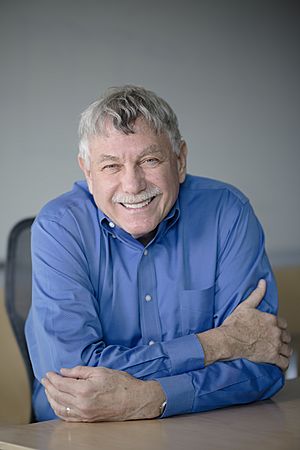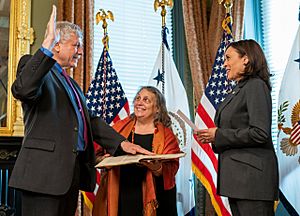Eric Lander facts for kids
Quick facts for kids
Eric Lander
|
|
|---|---|

Lander in 2023
|
|
| 11th Director of the Office of Science and Technology Policy | |
| In office June 2, 2021 – February 18, 2022 |
|
| President | Joe Biden |
| Preceded by | Kei Koizumi (acting) |
| Succeeded by | Alondra Nelson (acting) |
| Science Advisor to the President | |
| In office January 25, 2021 – February 18, 2022 |
|
| President | Joe Biden |
| Preceded by | Kei Koizumi (acting) |
| Succeeded by | Francis Collins (acting) |
| Personal details | |
| Born |
Eric Steven Lander
February 3, 1957 New York City, U.S. |
| Political party | Democratic |
| Spouse | Lori Lander |
| Education | Princeton University (BA) Wolfson College, Oxford (MSc, DPhil) |
| Awards | MacArthur Fellowship (1987) Dickson Prize (1997) Woodrow Wilson Award for Public Service (1998) Max Delbrück Medal (2001) Gairdner Award (2002) Harvey Prize (2012) Breakthrough Prize in Life Sciences (2013) William Allan Award (2018) |
| Scientific career | |
| Institutions | Broad Institute Massachusetts Institute of Technology |
| Thesis | Topics in Algebraic Coding Theory (1980) |
| Doctoral advisor | Peter Cameron |
| Doctoral students | Julie Segre Kenro Kusumi Manolis Kellis Erez Lieberman Aiden Mark Daly |
Eric Steven Lander (born February 3, 1957) is an American mathematician and geneticist. A geneticist is a scientist who studies genes and heredity. He is a professor of biology at the Massachusetts Institute of Technology (MIT) and a professor of systems biology at Harvard Medical School.
Lander was a key leader of the Human Genome Project, a massive scientific effort to map all of the genes in the human body. He also founded the Broad Institute, a famous research center. He served as the top Science Advisor to the President for both President Barack Obama and President Joe Biden.
Contents
Early Life and Education
Eric Lander was born in Brooklyn, New York City. His parents were Rhoda, a social studies teacher, and Harold, a lawyer. In high school, he was the captain of the math team and graduated at the top of his class in 1974. He even won a silver medal for the United States at the International Mathematical Olympiad.
When he was only 17, he wrote a paper about special kinds of numbers called quasiperfect numbers. This paper won him the Westinghouse Science Talent Search, a major award for young scientists.
Lander went to Princeton University and studied mathematics, again graduating at the top of his class in 1978. He then went to the University of Oxford in England as a Rhodes Scholar, where he earned his Ph.D. in a field of math related to coding.
Scientific Career
Throughout his career, Lander has studied many topics in genetics. These include how human genes vary from person to person, the history of human populations, and how to find genes linked to diseases.
From Math to Genetics
Even though he was a talented mathematician, Lander wanted a career that felt less lonely. His brother, a biologist, suggested he study the brain. To do that, Lander realized he needed to learn about cells, which led him to microbiology and finally to genetics.
He began working with David Botstein, a geneticist at MIT. Together, they created a computer program to help analyze maps of genes. This work was important for understanding complex diseases like cancer and diabetes. In 1986, Lander joined the Whitehead Institute at MIT and founded a center for genome research. This center became one of the best in the world.
The Human Genome Project
The Human Genome Project was a huge international effort to read the entire instruction book for a human being—our DNA. It was a race between a public group of scientists from around the world and a private company called Celera Genomics. The public project wanted to share all its findings for free.
Lander was a leader of the public project. He pushed his teams to work quickly to map the human genome and make the information available to everyone. In 2001, both groups published their first drafts of the human genome. Lander was the lead author on the paper published in the famous science journal Nature.
His team also helped map the genome of the mouse. This was important because mice are often used in research to understand human diseases.
The Broad Institute
Lander is the founding director of the Broad Institute, a research center created by MIT and Harvard. The institute uses genomics, the study of all of a person's genes, to understand diseases and find cures. Lander's work has helped advance cancer research and precision medicine, which aims to create treatments tailored to each individual person.
Government Service
Lander has advised two U.S. presidents on science and technology.
Advisor to President Obama
From 2009 to 2017, Lander served as a co-chair of the President's Council of Advisors on Science and Technology (PCAST) for President Barack Obama. This group gives the president advice on important issues related to science.
Advisor to President Biden
In 2021, President Joe Biden chose Lander to be his top Science Advisor to the President. The position was also made part of the president's Cabinet, showing its importance.
His nomination was confirmed by the U.S. Senate, and he was sworn into office on June 2, 2021. He took his oath on a rare copy of a 500-year-old Jewish text called the Pirkei Avot.
In February 2022, Lander resigned from his position. A report said that he had spoken harshly to people on his staff. Lander apologized, saying, "I am devastated that I caused hurt to past and present colleagues." He said he did not believe he could continue to be an effective leader.
Controversies
During his long career, Lander has been involved in some public disagreements.
- Toast to James Watson: In 2018, Lander gave a speech for the 90th birthday of James Watson, one of the scientists who discovered the structure of DNA. The speech caused controversy because some people felt Lander did not do enough to address Watson's offensive public comments. Lander later apologized for his speech.
- CRISPR Article: Lander wrote an article in 2016 about the history of CRISPR, a powerful gene-editing tool. He was criticized for not giving enough credit to the female scientists who made key discoveries, Jennifer Doudna and Emmanuelle Charpentier. They later won a Nobel Prize for their work. Lander said he did not mean to downplay anyone's role.
Return to Science
After leaving his government role, Lander returned to his positions as a professor at MIT and Harvard. He is also still involved with the Broad Institute. In 2023, he started a non-profit organization called Science for America. It focuses on big scientific challenges, like developing new energy sources and finding cures for cancer.
Awards and Recognition
- In 1999, he received the Golden Plate Award from the American Academy of Achievement.
- In 2004, Time magazine named him one of the 100 most influential people in the world.
- In 2012, he received the Dan David Prize, a major international award.
- In 2013, he was awarded the first Breakthrough Prize in Life Sciences.
- In 2017, he received the William Allan Award, a top prize in human genetics.
- In 2020, Pope Francis appointed him to the Pontifical Academy of Sciences.
 | Toni Morrison |
 | Barack Obama |
 | Martin Luther King Jr. |
 | Ralph Bunche |


